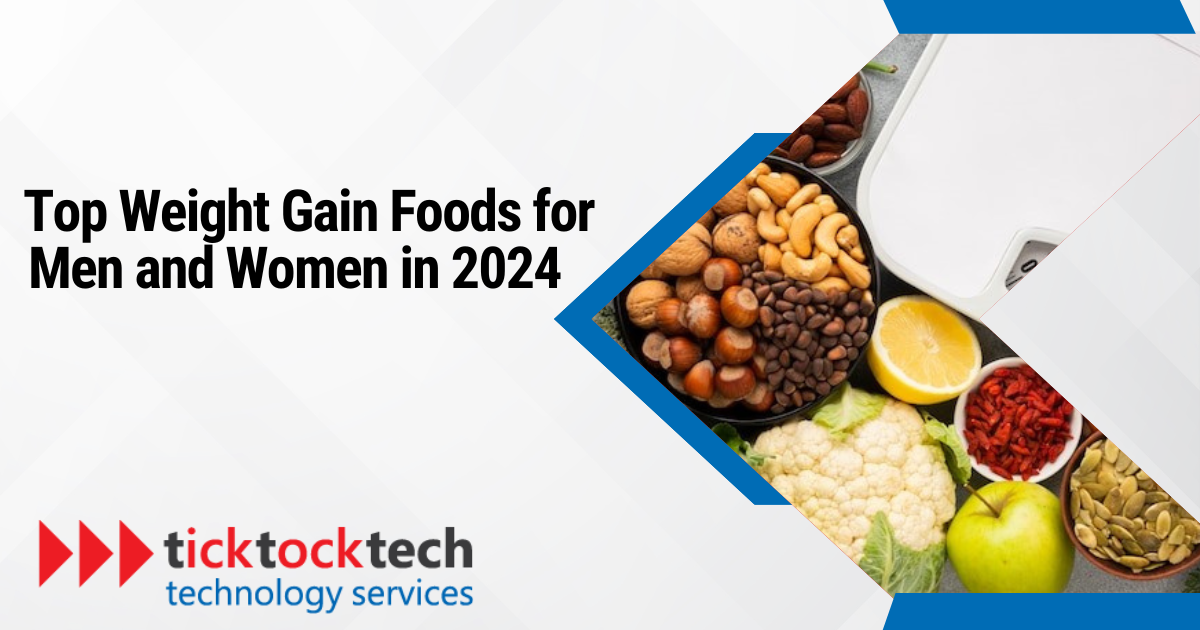Are you on the hunt for the best weight gain foods in 2024? Do you want to add a few extra pounds healthily? If you nodded yes, you’ve come to the right place!
In this modern age, fitness isn’t just about losing weight anymore. Some of us are on a mission to gain weight—and no, we’re not talking about eating anything that comes our way. We’re focusing on healthy weight gain that adds muscle, not just fat. In this article, we’ll be discussing the top weight gain foods that can help you add those extra pounds in a nutritious and sustainable way.
The 10 Best Healthful Foods to Gain Weight Fast
Gaining weight and adding muscle can be challenging, but with the right nutritional approach, it is easy. The key is to consume more calories than you burn and focus on nutrient-dense foods that contain protein, healthy fats, and complex carbohydrates.
Related: Best Fitness Equipment Brands
Below are the top 10 healthful foods that can help you gain weight fast in 2024:
1. Homemade protein smoothies
Homemade protein smoothies are an excellent option. Not only do they provide a boost of nutrients and calories, but they also allow you to customize the ingredients to suit your taste preferences.
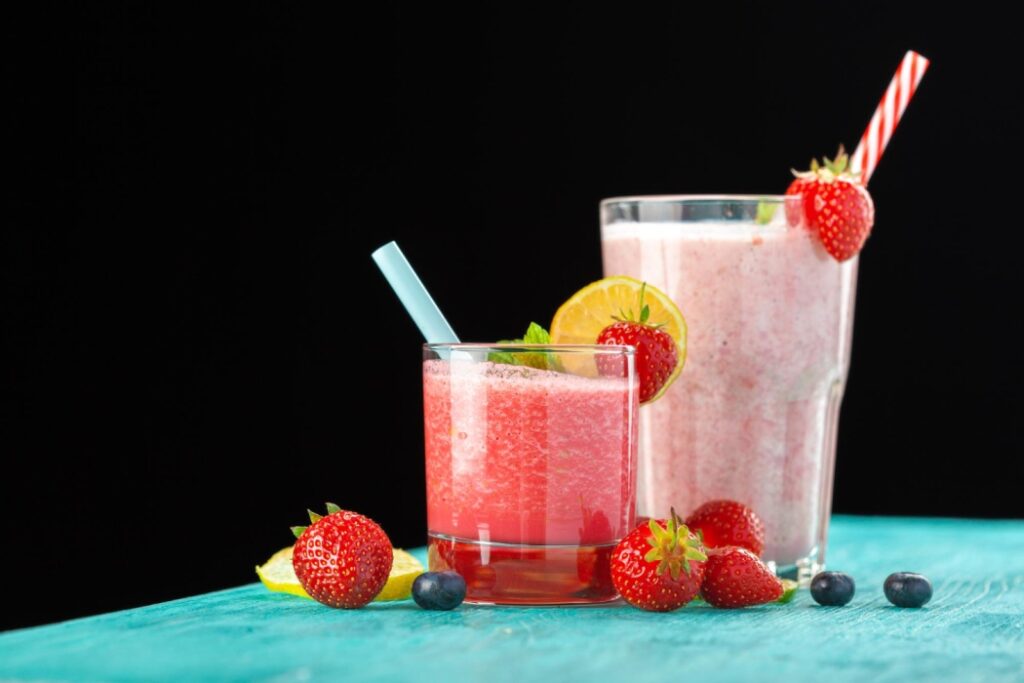
One of the benefits of making your own smoothies is that you have full control over the ingredients. This means you can choose the types and amounts of fruits, vegetables, proteins, and other nutrients. This is particularly useful if you have specific dietary needs or restrictions, such as lactose intolerance.
Here are three tasty and nutritious smoothie variations you can try:
Chocolate Banana Nut Shake
- 1 banana
- 1 scoop of chocolate whey protein
- 1 tablespoon (15 mL) of peanut or another nut butter
Vanilla Berry Shake
- 1 cup (237 mL) of fresh or frozen mixed berries
- Ice
- 1 cup (237 mL) of high protein, whole milk Greek yogurt
- 1 scoop of vanilla whey protein
Super Green Shake
- 1 cup (237 mL) of spinach
- 1 avocado
- 1 banana
- 1 cup (237 mL) of pineapple
- 1 scoop of unflavored or vanilla whey protein
Combine these ingredients with 2 cups or 470 milliliters (mL) of dairy milk or soy milk (if you have lactose intolerance) and blend until smooth. Each shake provides approximately 400-600 calories, along with a high amount of protein, healthy fats, fiber, and other essential vitamins.
2. Nuts and nut butter
Nuts and nut butter are valuable additions to any eating plan focused on weight gain because they are calorie-dense and highly concentrated in protein and healthy fats.
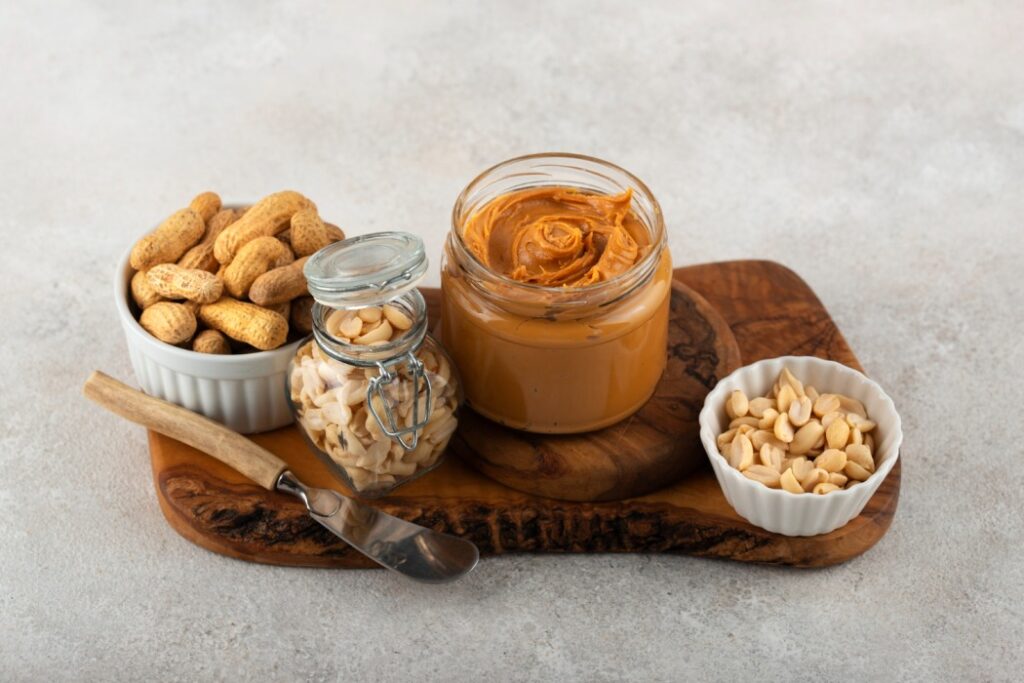
Consider the nutritional profile of just one small handful of raw almonds (1/4 cup or approximately 32 grams):
- Calories: 170
- Protein: 6 grams
- Fats: 15 grams (6 grams of which are monounsaturated)
Given their calorie density, with just two handfuls per day, you can easily add hundreds of calories to your diet.
You can easily incorporate nuts into your meals and snacks. Here are a few ideas:
- Add nuts to smoothies, yogurt, and oatmeal.
- Sprinkle nuts on top of salads, roasted vegetables, and soups.
- Use nuts as a crunchy coating for baked fish or chicken.
- Make your trail mix by combining nuts, seeds, dried fruits, and dark chocolate.
Nut butter is another versatile ingredient that can transform ordinary snacks into high-calorie treats. Here are some suggestions:
- Spread nut butter on whole-wheat toast, crackers, or celery sticks.
- Add nut butter to smoothies, shakes, and yogurt.
- Use nut butter as a dip for fruits, pretzels, or graham crackers.
- Make your nut butter cookies or energy bars.
When choosing nut butter, opt for 100% nut butter with no added sugar or extra oils. Alternatively, you can make your own nut butter at home. This allows you to control the ingredients and save money.
3. Red meats
Red meats, like beef and pork, are regarded as some of the most effective muscle-building foods available. Their nutritional profile makes them ideal for supporting muscle growth and strength.
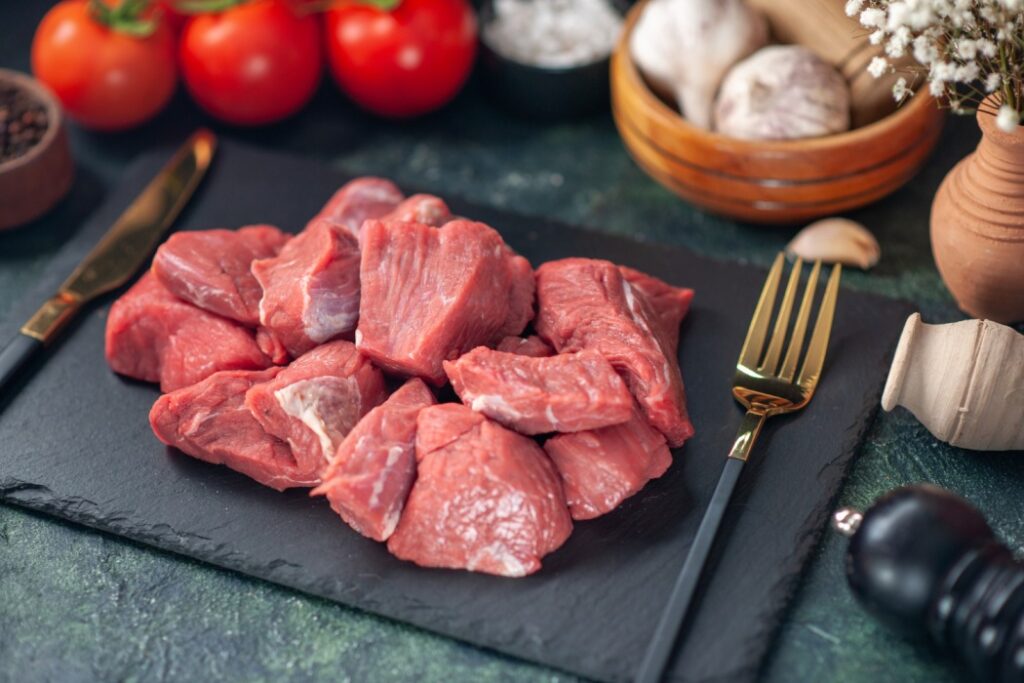
Consider the nutritional content of a 3-ounce (85-gram) serving of steak:
- Calories: 228
- Protein: 24 grams
- Leucine: Approximately 2.5 grams
Leucine is a crucial amino acid that plays a key role in stimulating muscle protein synthesis and facilitating the growth of new muscle tissue.
In addition to their protein content, red meats are a natural source of dietary creatine.
While lean cuts of red meat, such as pork tenderloin, can be a nutritious and protein-rich part of a balanced diet, it’s worth considering fattier cuts for weight gain. Fattier cuts provide more calories than leaner meats, helping you meet your increased calorie needs.
Research supports the benefits of consuming red meat for muscle building. A research review found that eating meat, particularly red meat, plays a crucial role in weight gain when combined with strength training. It also highlighted the potential of red meat in preventing muscle loss associated with aging.
However, it’s important to note that excessive consumption of red meat has been linked to certain health concerns, such as colorectal cancer. The current recommendation is to limit red meat intake to less than 500 grams per week.
4. Salmon and oily fish
Salmon and other oily fish are excellent sources of protein and healthy fats, including omega-3 fatty acids. Omega-3 fatty acids have been shown to offer numerous health benefits and may be linked to a reduced risk of various diseases, such as heart disease.
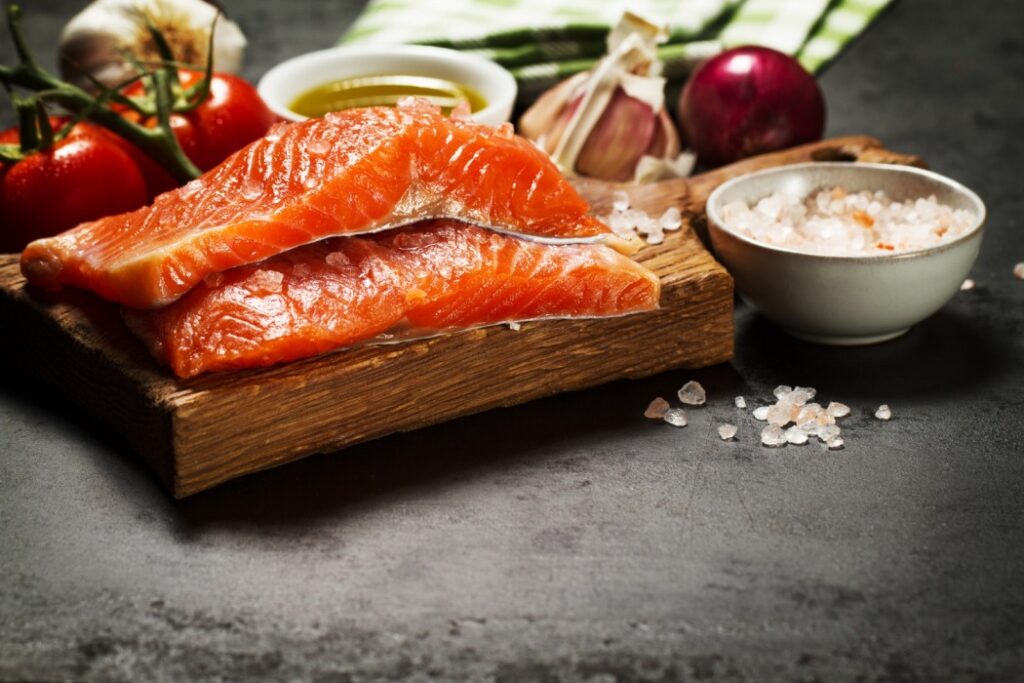
A 3-ounce (85-gram) serving of deboned wild Atlantic salmon provides approximately:
- Calories: 155
- Fats: 7 grams
- Protein: 22 grams
Salmon can be prepared in different ways, including steaming, sautéing, smoking, grilling, baking, or poaching. Additionally, smoked salmon and raw salmon (in sushi and sashimi) are great options. While fresh or frozen salmon may have a slightly higher price tag, canned salmon is a convenient and inexpensive alternative.
Here are some tasty and convenient ways to add salmon to your diet:
- Tuna salad: Replace canned tuna with canned salmon in your usual tuna salad recipe and add olive oil or mayonnaise for extra calories.
- Cobb salad: Make a Cobb salad with canned salmon instead of chicken, and add bacon, hard-boiled egg, avocado, lettuce, and tomatoes.
- Smoked salmon: Spread cream cheese on whole grain bread or crackers, add smoked salmon, and top with cucumber, tomato slices, or capers.
- Salmon salad: Create a salmon salad with leafy greens, asparagus, and some whole milk plain Greek yogurt, mayonnaise, or sour cream.
Incorporating salmon and other oily fish into your diet can provide numerous health benefits and support muscle growth or weight gain.
5. Avocados
Avocados are a unique fruit known for their high content of beneficial fats, unlike most other whole fruits. This characteristic makes them fairly calorie-dense for a substantial amount of energy.
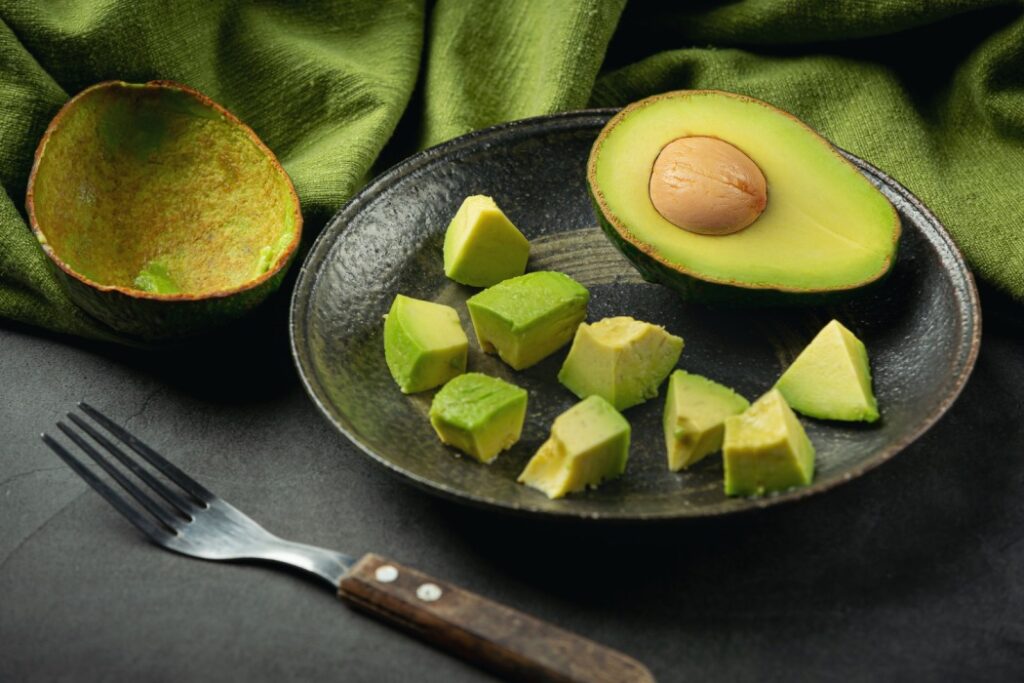
A single large avocado offers approximately:
- Calories: 365
- Fat: 30 grams
- Fiber: 17 grams
In addition to their calorie content, avocados are rich in vitamins, minerals, and various beneficial plant compounds that contribute to overall health.
Here are some more delicious ideas for incorporating avocados into your diet while increasing your calorie intake:
- Guacamole: Prepare guacamole by mashing avocados and adding ingredients like tomatoes, onions, cilantro, and lime juice. Enjoy it with tortilla chips or vegetables.
- Soups: Add sliced or mashed avocados to soups for a creamy texture and extra calories.
- Wraps: Use avocados as a filling for wraps or burritos, along with other nutritious ingredients like grilled chicken, vegetables, and whole-wheat tortillas.
- Fries: Cut avocados into strips, season them with spices, and bake or air-fry until crispy. These make a healthy alternative to traditional potato fries.
- Sushi: Incorporate avocado slices into sushi rolls or nigiri for a delicious and nutritious addition.
- As a Topping: Top your burgers, tacos, salads, or sandwiches with sliced or mashed avocados for extra flavor and calories.
- As a Mayonnaise Substitute: Use mashed avocados as a substitute for mayonnaise in sandwiches, salads, or dips. This can help you add healthy fats and reduce your intake of unhealthy saturated fats.
- Grilled or Baked: Grill or bake avocado slices and serve them as a side dish or as part of a main meal.
- Pickled: Pickle avocados in vinegar and spices to create a tangy and flavorful condiment that can be enjoyed with various dishes.
6. Dairy milk
Dairy milk has a long history of being used as a weight gainer or muscle builder, dating back decades. It is known for its balanced mix of protein, carbohydrates, fats, and vitamins.
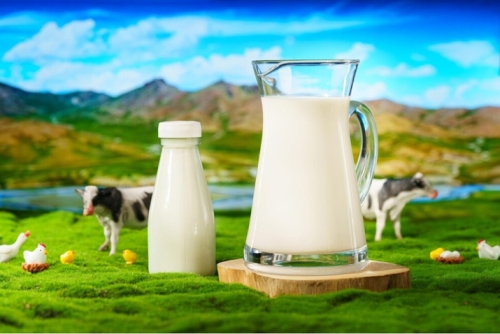
Research has consistently shown that milk can be an effective tool for building muscle. A review of studies found that cow’s milk adds significant muscle mass when combined with weightlifting exercises. Furthermore, other studies have found that milk, or a combination of whey and casein protein contributes to more mass gain than other protein sources. This advantage is attributed to the unique properties of milk proteins and their ability to stimulate muscle protein synthesis.
To incorporate dairy milk into your weight gain meal plan, consider drinking 1 cup (237 mL) of whole milk as a snack, with a meal, or before and after a workout. Each serving of whole milk provides approximately 149 calories and 8 grams of protein, making it a nutritious way to increase your calorie and protein intake.
Remember to choose whole milk over skim milk or low-fat milk to reap the full benefits of its calorie and fat content. Whole milk contains more calories and healthy fats, which are essential for weight gain.
7. Eggs
Eggs are an excellent source of nutrition for muscle building and overall health. They provide a unique combination of high-quality proteins and fats. Each large raw egg, weighing 2 oz with a shell (50 g), contains approximately 74 calories.
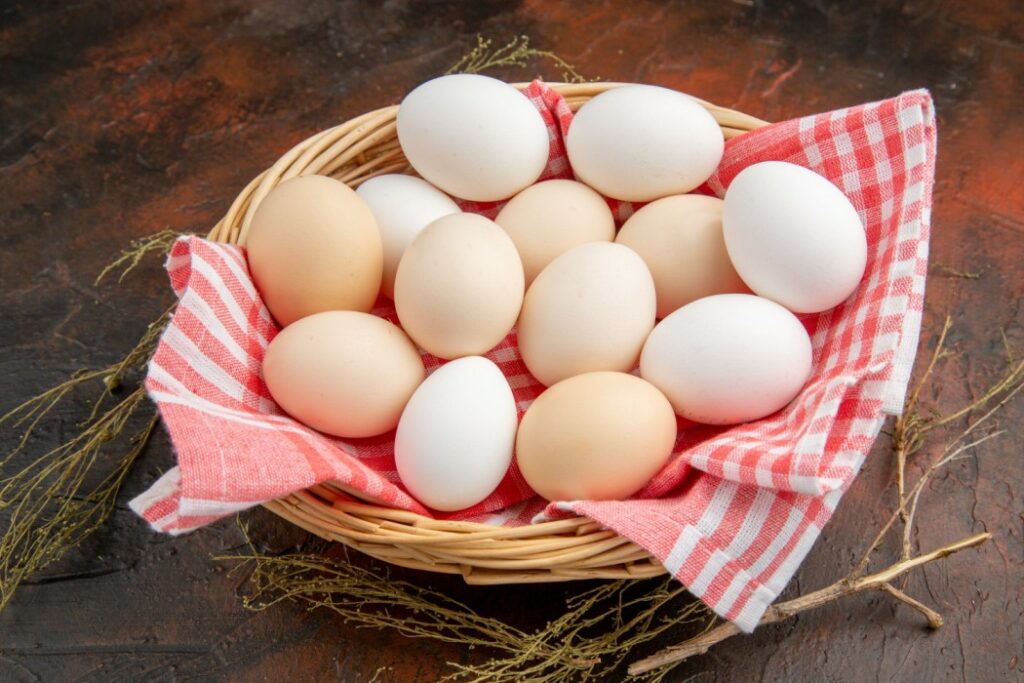
It’s important to consume whole eggs, as the majority of the beneficial nutrients are found in the yolk. In fact, the yolk contains nearly all the egg’s vitamins, minerals, and antioxidants, including vitamin D, B vitamins, and choline.
Unless you have an egg intolerance or allergy, there’s no need to limit your egg consumption. In fact, research suggests that eating up to three eggs per day is safe and may even have health benefits.
Eggs are highly versatile and can be cooked in different ways, including boiling, poaching, frying, baking, and scrambling. They can be used in several dishes, such as salads, casseroles, sandwiches, baked egg muffins, bread substitutes, and desserts like egg custard and créme brûlée.
Here are some delicious recipes that incorporate eggs:
- Baked egg muffins
- Egg and vegetable omelet
- Avocado toast with fried eggs
- Egg and cheese sandwich
- Egg and spinach quiche
- Egg and mushroom frittata
- Egg and bacon salad
Incorporating eggs into your diet can be a simple way to boost your protein intake and support muscle growth. With their nutritional value, eggs are a great addition to any meal plan.
8. Cheese
This has been a beloved food known to be a rich source of calories and fats. Cheese comes in countless varieties, each with its own unique taste and characteristics. From mild and creamy to sharp and tangy, there’s a cheese out there to suit every palate. Exploring different types of cheese can be a delightful culinary adventure.
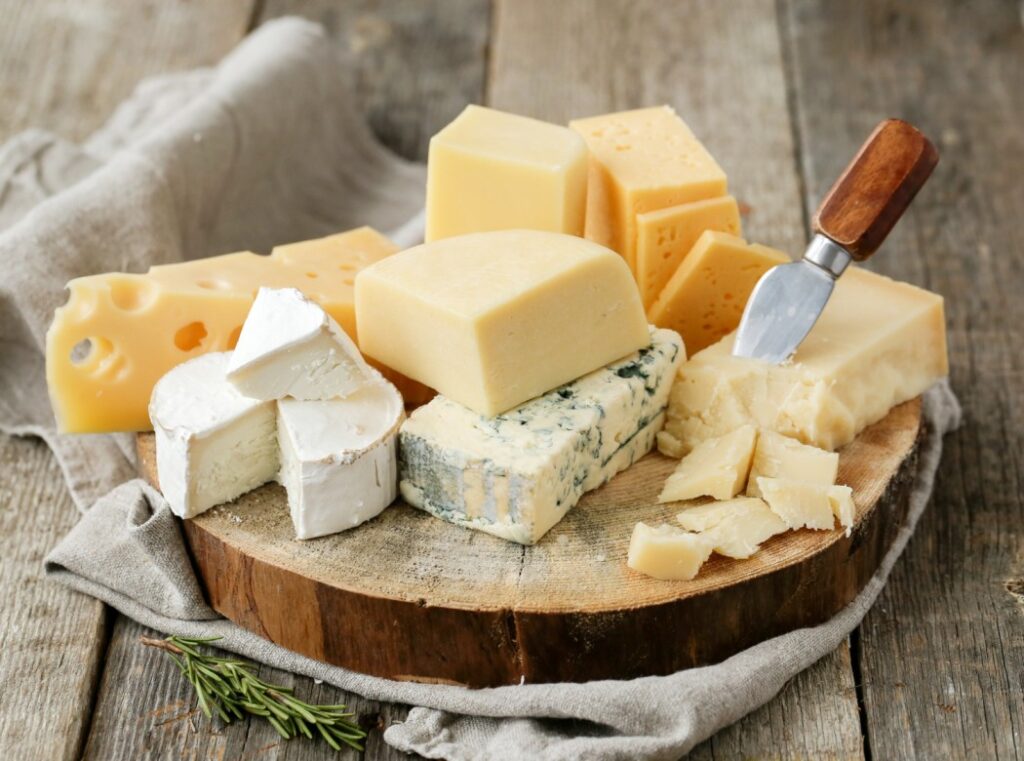
It’s important to note that many cheeses contain cholesterol and saturated fat. Like most high-calorie foods, it’s best to consume cheese in moderation. However, it’s worth mentioning that cheese also offers several health benefits. It is a good source of protein, calcium, phosphorus, vitamin B12, and vitamin A. The nutritional value and calorie count of cheese varies depending on factors such as the fat content of the milk used, the processing method, and the age of the cheese.
One popular dish that combines calories, carbohydrates, and protein is macaroni and cheese. This classic comfort food can serve as a canvas for incorporating nutrient-dense additions like broccoli or peas. To boost the calorie and protein content, you can add small amounts of bacon or other meats like pulled pork.
9. Dried fruit
Dried fruit is a nutritious snack rich in calories, antioxidants, and micronutrients. There are different types of dried fruits, each with its unique flavor and nutritional profile. Dried fruit is a convenient and portable snack that can be easily combined with a protein source, such as cuts of meat or cheese, to create a balanced and satisfying meal.
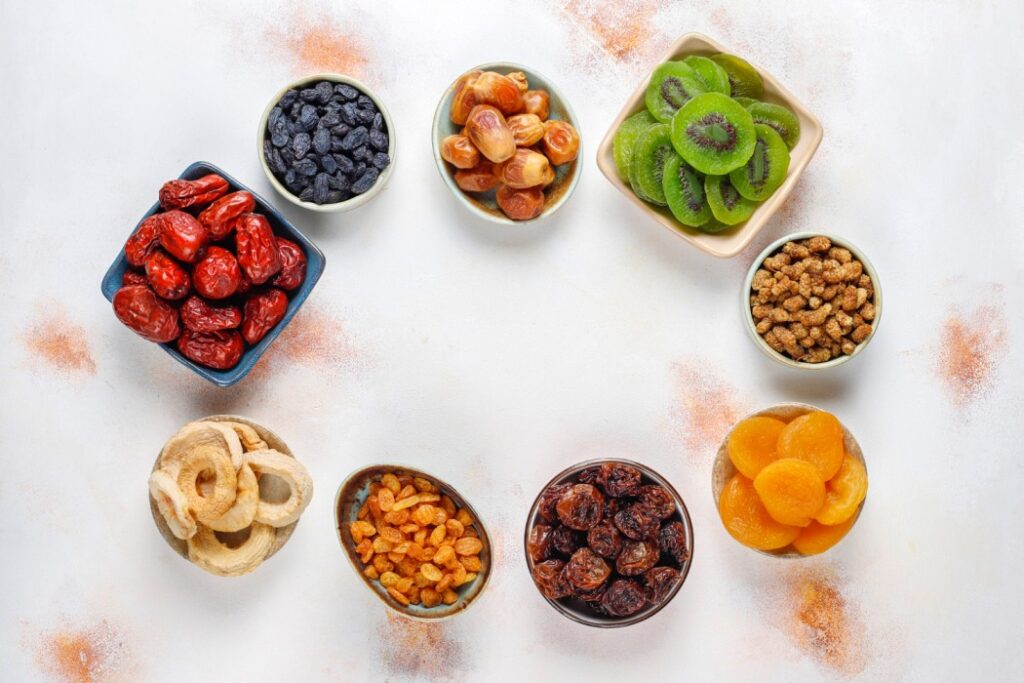
Dried fruit also mixes well with nuts and whole plain Greek yogurt, providing a blend of fats, protein, and other key nutrients. It is a good source of fiber, and most of its vitamins and minerals remain intact when dried.
One type of dried fruit that is particularly nutritious is dates. Dates are high in fiber and antioxidants, and are also simple to prepare as a high-calorie snack. Just two Medjool dates provide about 130 calories, making them a convenient and healthy way to boost your calorie intake.
Many ways to enjoy dates include filling them with nut butter, cream cheese, or cooked grains like rice or quinoa. You can also add one or two dates to smoothies, sauces, and dressings for sweetness.
10. Dark chocolate
Chocolates with at least 70% cacao content, offer several health benefits. Dark chocolate is rich in antioxidants and contains essential micronutrients. Studies have shown that consuming dark chocolate with a high cacao content can lower markers of inflammation and potentially benefit heart health.
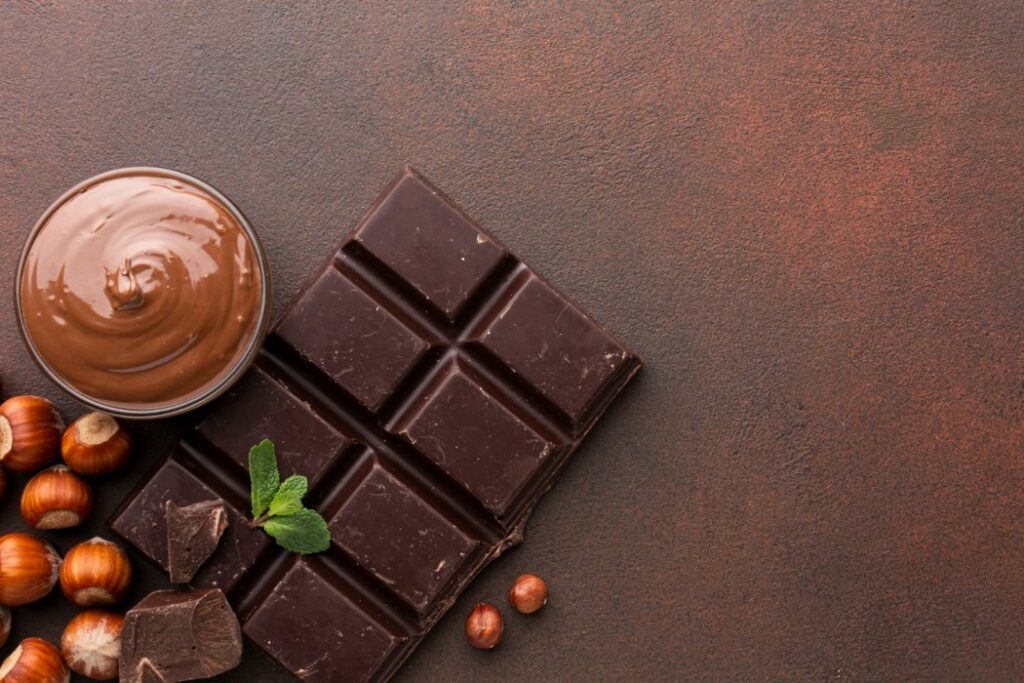
Dark chocolate is also calorie-dense due to its high fat content. A 100-gram bar of dark chocolate with 60-75% cacao solids contains around 600 calories. However, it also provides fiber, magnesium, and antioxidants, making it a nutrient-rich treat.
In addition to enjoying dark chocolate on its own, there are different ways to incorporate it into your diet. You can top cereal with dark chocolate, add it to trail mix or granola, pair it with fruit, dissolve it in hot milk, or dip it into nut butter. Dark chocolates are also used to make delicious desserts like energy bites, chocolate truffles, or chocolate peanut butter avocado pudding.
When purchasing dark chocolates, it’s crucial to choose high-quality options with at least 70% cacao content. This ensures that you’re getting the maximum health benefits and avoiding excessive added sugars and unhealthy fats.
Conclusion
To gain weight healthily, incorporate nutrient-dense foods like homemade protein smoothies, nuts, red meats, salmon, avocados, dairy milk, eggs, cheese, dried fruits, and dark chocolate into your diet. Remember to focus on calorie consumption and strength training for effective muscle growth.

